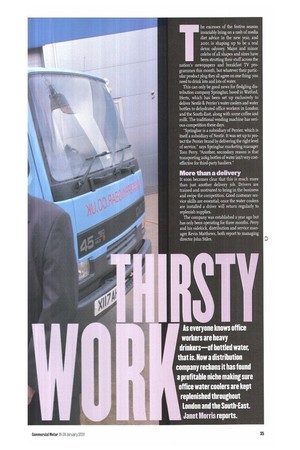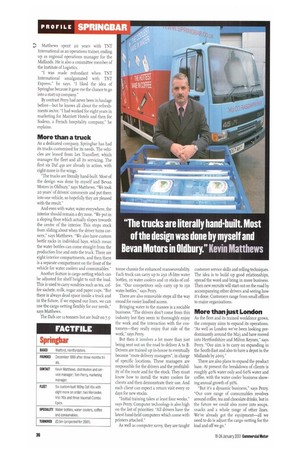T he excesses of the festive season invariably bring on a
Page 37

Page 38

If you've noticed an error in this article please click here to report it so we can fix it.
rash of media diet advice in the new year, and 2001 is shaping up to be a real detox odyssey. Major and minor celebs of all shapes and sizes have been strutting their stuff across the nation's newspapers and breakfast TV programmes this month, but whatever their particular product plug they all agree on one thing: you need to drink lots and lots of water.
This can only be good news for fledgling distribution company Springbar, based in Watford, Herts, which has been set up exclusively to deliver Nestle & Perrier's water coolers and water bottles to dehydrated office workers in London and the South-East, along with some coffee and milk The traditional vending machine has serious competition these days.
"Springbar is a subsidiary of Perrier, which is itself a subsidiary of Nestle. It was set up to protect the Perrier brand by delivering the right level of service," says Springbar marketing manager Tom Perry "Another, secondary reason is that transporting zokg bottles of water isn't very costeffective for third-party hauliers."
More than a delivery
It soon becomes dear that this is much more than just another delivery job. Drivers are trained and motivated to bring in the business and swipe the competition. Good customer service skills are essential; once the water coolers are installed a driver will return regularly to replenish supplies.
The company was established a year ago but has only been operating for three months. Perry and his sidekick, distribution and service manager Kevin Matthews, both report to managing director John Wes. Matthews spent 2o years with TNT International as an operations trainer, ending up as regional operations manager for the Midlands. He is also a committee member of the Institute of Logistics.
"I was made redundant when TNT International amalgamated with TNT Express," he says. "I liked the idea of Springbar because it gave me the chance to go into a start-up company."
By contrast Perry had never been in haulage before—but he knows all about the refreshments sector. "I had worked for eight years in marketing for Marriott Hotels and then for Soclexo, a French hospitality company," he explains.
More than a truck
As a dedicated company. Springbar has had its trucks customised for its needs. The vehicles are leased from Lex Transfleet, which manages the fleet and all its servicing. The first six Daf 45s are already in action, with eight more in the wings.
"The trucks are literally hand-built. Most of the design was done by myself and Bevan Motors in Oldbury," says Matthews. "We took 20 years' of drivers' comments and put them into one vehicle, so hopefully they are pleased with the result."
And even with water, water everywhere, the interior should remain a dry zone. "We put in a sloping floor which actually slopes towards the centre of the interior. This stops stock from sliding about when the driver turns corners," says Matthews. "We also have custom bottle racks in individual bays, which mean the water bottles can come straight from the production line and onto the truck. There are eight interior compartments, and then there is a separate compartment on the front of the vehicle for water coolers and consumables."
Another feature is cargo netting which can be adjusted for shelf height to suit the load. This is used to carry sundries such as tea, coffee sachets, milk, sugar and paper cups. "But there is always dead space inside a truck and in the future, if we expand our lines, we can use the cargo netting flexibly for our needs," says Matthews.
The Dafs are ir-tonners but are built on 7.5 tonne chassis for enhanced manoeuvrability. Each truck can carry up to 25o 18-litre water bottles, so water coolers and ro sticks of coffee, "Our competitors only carry up to 150 water bottles," says Perry.
There are also removable steps all the way round for easier loadbed access.
Bringing water to the masses is a sociable business. "The drivers don't come from this industry but they seem to thoroughly enjoy the work and the interaction with the customers—they really enjoy that side of the work," says Perry
But then it involves a lot more than just being sent out on the road to deliver A to B. Drivers are trained up in-house to eventually become "route delivery managers", in charge of specific locations. These managers are responsible for the drivers and the profitability of the route and for the stock. They must know how to install the water coolers for clients and then demonstrate their use. And each client can expect a return visit every TO days for new stocks.
"Initial training takes at least four weeks," says Perry. Computer technology is also high on the list of priorities: "All drivers have the latest hand-held computers which come with printers attached."
As well as computer savvy, they are taught customer service skills and selling techniques. The idea is to build up good relationships, spread the word and bring in more business. Then new recruits will start out on the road by accompanying other drivers and seeing how it's done. Customers range from small offices to major organisations.
More than just London
As the fleet and its trained workforce grows, the company aims to expand its operations. "As well as London we've been looking predominantly around the M25 and have moved into Hertfordshire and Milton Keynes," says Perry. "Our aim is to carry on expanding in the South-East and also to have a depot in the Midlands by 2003."
There are also plans to expand the product base. At present the breakdown of clients is roughly 40% water only and Go% water and coffee, with the water cooler business showing annual growth of 3o%.
"But it's a dynamic business," says Perry. "Our core range of consumables revolves around coffee, tea and chocolate drinks, but in the future we could also move into soups, snacks and a whole range of other lines. We've already got the equipment—all we need to do is adjust the cargo netting for the load and off we go."
































































































